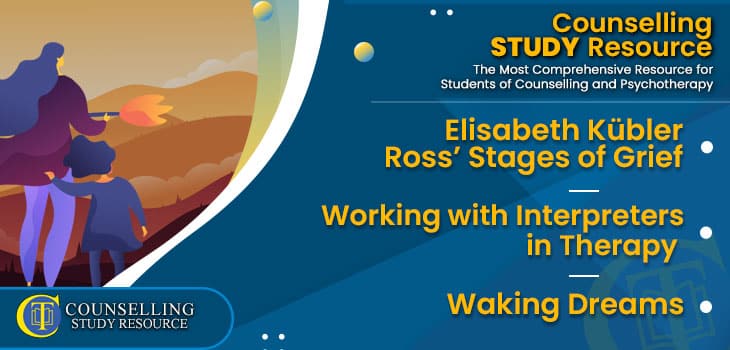249 – Stages of Grief
Working with Interpreters in Therapy – Waking Dreams
Starting off 2023 with Episode 249 of the Counselling Tutor Podcast, your hosts Rory Lees-Oakes and Ken Kelly return with two familiar topics – and a new addition, ‘Practice Today’, where we look at contemporary developments and challenges you may face in the therapy room.
In today’s podcast:
- Returning with ‘Theory in Practice’, today we look at Elisabeth Kübler-Ross’ stages of grief.
- Then in our new section ‘Practice Today’ we look at working with interpreters in therapy.
- And finally, returning once again is ‘Practice Matters’ where today Rory speaks with Allan Frater about waking dreams.
Elisabeth Kübler-Ross’ Stages of Grief [starts at 02:54 mins]
This segment of the Counselling Tutor Podcast is sponsored by
WebHealer.net
- WebHealer are the go-to provider of websites for private practitioners in the UK.
- Established over 20 years, WebHealer offers a non-technical and fully supported service to help therapists grow their private practice.
- Just one customer from your website each year pays for their service.
Go to WebHealer.net and use coupon CT100 for £100 off their "Do it for me" service.
You’ve probably heard the 5 stages of grief: denial, anger, bargaining, depression and acceptance – and in this section, Rory and Ken will explore these stages in more depth and how they may present in the therapy room:
- The 5 stages of grief are often presented in a linear format – however, this isn’t always the case. The stages can present in any order, and for some people, not all stages will be experienced.
- A client may experience retrospective bargaining – thinking things like ‘if I had done this…’, ‘if only I had thought to…’.
- The theory of the stages was put together from observing people who were dying – this means it may not always translate to those who have lost someone.
- The theory has been adapted and modified since its initial release.
- Using the stages as an example, we can normalise a client's feelings of anger – removing some of the guilt/shame they may experience from feeling this way.
- Any of the stages can persist long after the initial loss – they can especially be triggered by things such as birthdays or anniversaries.
- All of the stages can be reverted into – acceptance isn’t a finality.
Theory to Practice is sponsored by
Counselling Skills Academy
Learn counselling techniques by seeing counselling skills used in real sessions by qualified therapists.
Real sessions – real-life presentations – real skills.
Working with Interpreters in Therapy [starts at 19:51 mins]
In the therapy room, you may be in a situation where your client is unable to communicate with you using spoken English. If you have a client that speaks a language you don’t or communicates using sign language – you will need to find a way to understand and respond to them.
The key points of this section on working with interpreters in therapy include:
- If you choose to look for an in-person interpreter or translator for counselling – you shouldn’t use a family member/friend of the client. There may be things the client doesn’t feel comfortable sharing with them in the room, or the translation you receive may be filtered.
- When you are given a translation from a third party, the client’s words are now coming from the translator’s frame of reference. This is something important to be aware of when working with interpreters in therapy.
- Keep a close eye on the clients’ body language - look out for the emotions they are conveying through this.
- If you decide to look into using translating software (such as Google Translate), there are some things you need to consider:
- There is an assumption of literacy, your client may not be able to read and/or write.
- There is a chance of the translation being inaccurate.
- If a client is typing their material into this translation software, do you know if this data is protected? Or if it is stored by the application?
- Be wary of these things if that is the path you decide to take.
Get on-demand Certified CPD that is implementable in your practice
Counsellor CPD Library
- Over 150 hours of on-demand CPD lectures to help you stay current with your CPD ethical requirements
- Support, and be supported, by thousands of other counsellors as a member of the exclusive online community.
- Access your learning anytime you want ... anywhere you choose ... using any device type — desktop or mobile.

Waking Dreams [starts at 35:39 mins]
In this week’s ‘Practice Matters’, Rory speaks with Allan Frater about waking dreams.
The main points of this discussion include:
- Waking dreams are a mixture of waking and dreaming – the overlap of an imagined reality and the normal, physical world.
- Thinking about memories as images.
- Considering worrying about next week as an imagined reality that overlaps with physical reality.
- In therapy you might explore waking dreams with their eyes open – this allows the client to remain grounded in the room with you, working with images in a safe way.
- You can look into stand-out images in these waking dreams and what they might mean.
The National Counselling and Psychotherapy Society is proud to sponsor Practice Matters.
NCPS (formerly NCS) are really excited to have launched their Children and Young People Therapist Register for counsellors working with the younger age group.
Free Handout Download
The Grieving Process According to Elisabeth Kübler-Ross
